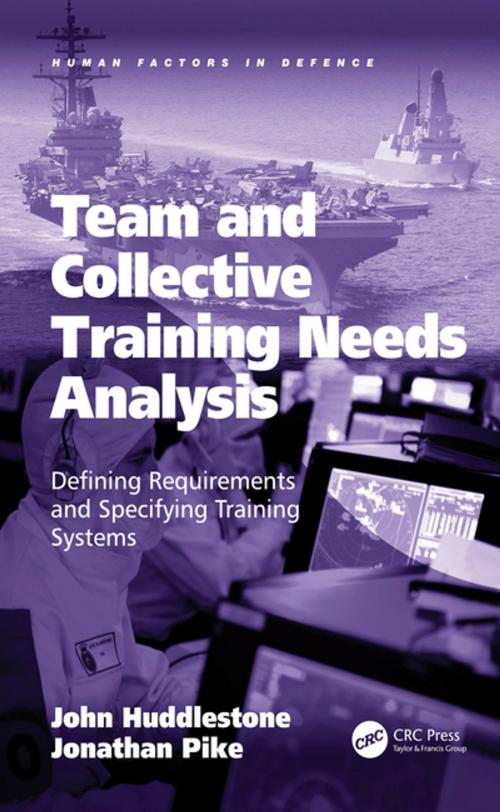Team and Collective Training Needs Analysis
Defining Requirements and Specifying Training Systems
Nonfiction, Science & Nature, Technology, Industrial Health & Safety, Military Science, Computers| Author: | John Huddlestone, Jonathan Pike | ISBN: | 9781134794942 |
| Publisher: | CRC Press | Publication: | July 12, 2017 |
| Imprint: | CRC Press | Language: | English |
| Author: | John Huddlestone, Jonathan Pike |
| ISBN: | 9781134794942 |
| Publisher: | CRC Press |
| Publication: | July 12, 2017 |
| Imprint: | CRC Press |
| Language: | English |
Military capability is delivered operationally at a team and collective level, be it a unit as small as a squad or section, or as large as a maritime task group. Modern military forces are required to deal with a potentially wide range of missions frequently involving multiple alliance partners, within a geopolitical environment which can seem to change rapidly. Individual performance, while being important, is not the primary determinant of mission success - force integration, interoperability, adaptability and teamwork are key factors. Team and collective training which fully addresses these factors is fundamental to the development and delivery of military capability. As a consequence, the requirement to determine training requirements and specify effective systems for the delivery of team and collective training is critical to operational success.
Training Needs Analysis (also known as Front End Analysis), is a well-established methodology for analysing training requirements and specifying training solutions used extensively by the UK and its NATO partners. However, the analytical techniques employed are optimised for individual training, with little guidance being offered on its application in the team and collective context. Team and Collective Training Needs Analysis (TCTNA) has been developed to close this methodological gap. It addresses the issues of the relationship of individual and team tasks, teamwork, command and control, task and training environments, scenario definition, instructional strategy, team training approaches, instructional functions, and wide-ranging organisational and procurement considerations.
Part One of the book develops an integrated set of models which underpin the analytical approach presented in Part Two. Worked examples and case studies illustrate the application of the approach. Between 2005 and 2015 the authors worked on numerous training-related research projects at Cranfield University and Coventry University for the Human Factors Integration Defence Technology Centre and the Defence Human Capability Science and Technology Centre on behalf of the Defence Science and Technology Laboratory, UK Ministry of Defence.
Military capability is delivered operationally at a team and collective level, be it a unit as small as a squad or section, or as large as a maritime task group. Modern military forces are required to deal with a potentially wide range of missions frequently involving multiple alliance partners, within a geopolitical environment which can seem to change rapidly. Individual performance, while being important, is not the primary determinant of mission success - force integration, interoperability, adaptability and teamwork are key factors. Team and collective training which fully addresses these factors is fundamental to the development and delivery of military capability. As a consequence, the requirement to determine training requirements and specify effective systems for the delivery of team and collective training is critical to operational success.
Training Needs Analysis (also known as Front End Analysis), is a well-established methodology for analysing training requirements and specifying training solutions used extensively by the UK and its NATO partners. However, the analytical techniques employed are optimised for individual training, with little guidance being offered on its application in the team and collective context. Team and Collective Training Needs Analysis (TCTNA) has been developed to close this methodological gap. It addresses the issues of the relationship of individual and team tasks, teamwork, command and control, task and training environments, scenario definition, instructional strategy, team training approaches, instructional functions, and wide-ranging organisational and procurement considerations.
Part One of the book develops an integrated set of models which underpin the analytical approach presented in Part Two. Worked examples and case studies illustrate the application of the approach. Between 2005 and 2015 the authors worked on numerous training-related research projects at Cranfield University and Coventry University for the Human Factors Integration Defence Technology Centre and the Defence Human Capability Science and Technology Centre on behalf of the Defence Science and Technology Laboratory, UK Ministry of Defence.















